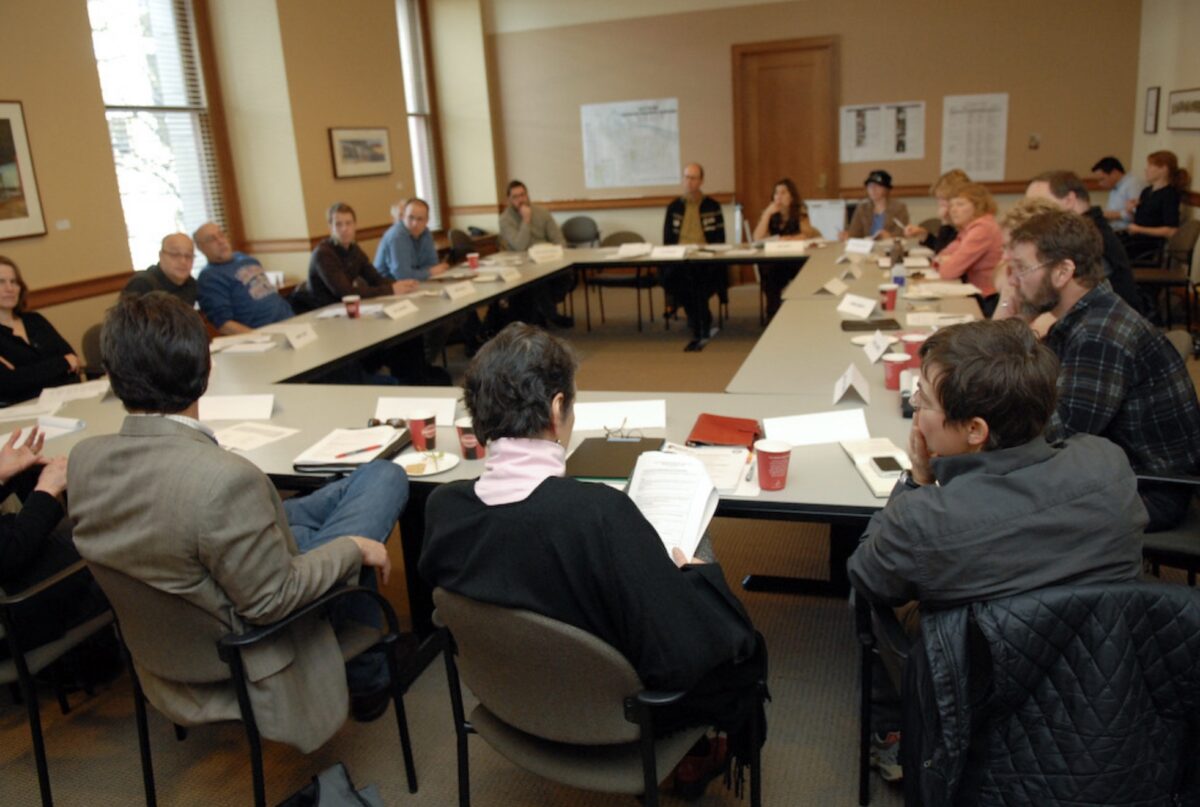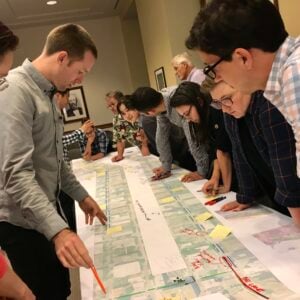
(Photo: Jonathan Maus/BikePortland)
At long last the Portland Bureau of Transportation has a plan to make their modal advisory committees better and — hopefully — more fair.
There are three main bodies that meet every month to advise and inform PBOT policies and projects. They are the freight, pedestrian and bicycle advisory committees. While they’re set up with a PBOT staff liaison and are ostensibly able to influence decisions on a level playing field, that isn’t always the case. There has been a growing number of concerns from some committee members that they are not respected or listened to enough. And the freight committee in particular has a major unfair advantage when it comes to the ability to influence staff.
We got news of the committee overhaul from a PBOT source last week and then noticed a forthcoming agenda item at the joint bicycle and pedestrian advisory committee scheduled for next week that reads, “Kristin Hull with PBOT will briefly discuss and answer questions about a bureau effort to improve the modal advisory committee system.”
This issue has been building for several years.
Advertisement
Back in 2017 as part of a large-scale reform effort, former commissioner Chloe Eudaly made some big changes at Office of Community & Civic Life, the bureau that oversees the 100+ advisory bodies within the City of Portland. One of those reforms was to strictly enforce term limits to ensure that no member of an advisory body could serve for more than eight years. This led to several veteran members of the Bicycle Advisory Committee being forced to leave against their will.
Term limits are a good thing, but the freight committee hasn’t had to abide by the same rules as the other two committees and as such, retains an unfair advantage and undue influence over PBOT.
The freight committee has been allowed to retain all their members, despite some of them being on it for 14 and even 16 years (the Freight Advisory Committee was established in 2003). In 2020, 15 of the 25 FAC members (60%) had served for over eight years. But when leaders of the committee balked at the term limit rules, Commissioner Eudaly agreed to give them a special exemption to the rules. In a letter dated March 31, 2020, Eudaly gave the freight committee permission to ignore the term limit rule until the city adopts a new Freight Master Plan, a process currently underway.

Another unfair advantage enjoyed by the freight committee is that its members are paid by the corporations they work for to attend the meetings. The pedestrian and bike committees are volunteers who attend meetings in the evenings. The freight committee meets during the business day.
The freight committee is also the least racially diverse of the three committees. And because their members have been allowed to remain, they have no plans for a large-scale recruitment. In a report from PBOT on the city’s 5-Year Racial Equity Plan passed by the Office of Equity & Human Rights in 2016, the bureau said, “Staff expressed concerns that the bureau relied too heavily on its advisory committees, who are generally occupied by white people who sit on multiple committees for extended periods of time, and do not represent the varied interests of the community at large, but rather their own special interests.”
Fixing these long-running problems with the freight committee should be a top priority.
The conversation around committee reform is also likely to include ideas to re-organize them. There’s been talk for years about the bike and ped committees moving into one committee. Others have recently suggested that we have just one committee — and that its powers get bumped up into a commission so it has voting power similar to the Design Commission or the Planning & Sustainability Commission.
And what about scooter riders and other types of micromobility users? Or transit riders? Or even car drivers? None of those groups are currently represented by a PBOT modal committee. Reforms are long overdue!
If you’d like to join this discussion tune into the joint bike and pedestrian committee meeting next Tuesday (5/17) from 6:00 to 8:00 pm. You can learn more and find the Zoom links here.







Thanks for reading.
BikePortland has served this community with independent community journalism since 2005. We rely on subscriptions from readers like you to survive. Your financial support is vital in keeping this valuable resource alive and well.
Please subscribe today to strengthen and expand our work.
Here in Eugene we renamed the Bicycle and Pedestrian Advisory Committee to “Active Transportation Committee” a while ago. “Active Transportation” may be too jargony? If the committee were to rename itself now, I would suggest the “Walk & Roll Advisory Committee.” I’m not on the committee, myself.
“There has been a growing number of concerns from some committee members that they are not respected or listened to enough.”
I completely fail to understand how these suggested reforms will change anything for the better. This PBOT process is a classic case of greenwashing away the real issues of PBOT staff incompetence. It’s true that many if not all the Freight Committee members are paid staffers of their respective organizations, often paid well in fact; but the representatives from the Street Trust, Oregon Walks, and several other organizations are also paid, maybe peanuts compared to the FAC members, but loads more than the neighborhood representatives who aren’t paid at all.
And who wins and loses with PBOT-imposed term limits? Not the FAC members – even if the city imposes term limits on them and waters-down their representation on the FAC with neighborhood and/or BIPOC members, the current FAC members will simply meet behind closed doors, away from the press and public scrutiny. City staff will still show up, the current FAC members will still have huge influence, but the public will be none the wiser, and the new public FAC will be just like the BAC and PAC – poorly staffed and largely ignored. The small modal nonprofits like the Street Trust and Oregon Walks will be similarly unaffected by the term limits as they already suffer from high staff turnover anyway – it’s a rare staffer who is still working there after 6 or 8 years given the poor pay. The groups who will suffer most will be unpaid volunteers from the neighborhoods and BIPOC groups who will be pushed out just as soon as they begin to understand the process and have some fleeting influence. How is the public good served by this?
The group that most badly needs term limits are the PBOT staffers themselves, particularly the senior planners and engineers who have mismanaged the agency as it has seen a regular slide in bicycle and pedestrian user safety and mode share. Defund PBOT and start over.
Post of the week.
I second this for comment of the week.
Absolutely. PBOT is a failed organization.
We pay people lots of money to understand how to build safe roads. There is tons of literature and studies on how to build safe roads. What are these non-freight committees even for? Does PBOT really not understand the traffic patterns in the city? Do they not understand that their wide, straight roads with no traffic control devices are going to encourage drag racing and be dangerous for pedestrians to cross?
I’d rather just have PBOT be honest. Their one and only priority is motorist speed and access. Everything else is secondary. They over-inflate the cost of every “safety” project they do trying to chase the “safe but fast” road unicorn which is why we are always the beneficiaries of incomprehensible “experimental” traffic designs. We’re spending the money for platinum level infrastructure in getting false gold infrastructure because PBOT will never ever just have motorists lose one.
I know a decent amount of planners, and they are all in to complete streets and safe streets. The only thing I’m left with is that it must be PBOTs archaic, out of touch leadership that hamstrings literally every project by making sure that motorists are the focal point.
Obviously you feel strongly about this issue, David, but surely you know the “defund” model just doesn’t work. The real issue for me is leadership: too many gov’t leaders don’t know how to involve people meaningfully in the important work of gov’t. And the cause is one you identified correctly: low pay. Few really skilled leaders want to work in gov’t b/c of the low pay – they are mostly working in corporations where the pay is high.
You can find salary info on the city’s website. A Bureau Director’s annual salary currently tops out at $248,310. This is factored into their lifetime pension formula, and is also the basis for the the 6% PERS retirement account contribution (which is invested in the stock market and is completely separate from the defined benefit pension). A comparable private sector boss might do better, but people like Adena Long aren’t exactly struggling financially.
And defund PBOT, you’re right, how does that work? Isn’t PBOT funded largely through gas taxes and parking fees? If you stop collecting that money, how does that advance modal goals?
Is there an example of a municipal organization being gutted and rebuilt actually going well? It seems like you wind up with:
a) incompetence if you hire true industry outsiders
b) a worse entrenchment of moneyed interests if you hire qualified candidates, since lobbyists & corporate entities in the same field are generally the most qualified in the near term
What do you expect when Hardesty- and Eudaly before her- runs PBOT? Competence?
I don’t know much about PBOT committees, but I do know that the city charter is badly in need of reform so that people who happen to get elected to the city council are no longer put in charge of bureaus and departments despite having no qualifications, experience, or skills in running such organizations. Hardesty is the only candidate for position 3 who does not explicitly support a change in the role of council members; the status quo is failing.
Also, and of great importance, we have an election this month. Per Multnomah County website, “Voted ballots must be received at any County elections office in Oregon or Official Ballot Drop Site location by 8:00 p.m., Tuesday, May 17, or postmarked by May 17, to be counted.”
If you want to see change in city policies, vote for change at City Hall. That’s why I am supporting Vadim Mozyrsky for City Council.
“Great committees take work to manage and participate in, but the payoff can be huge.”
That assertion is true in general, but not in Portland, in my experience.
A stronger advisory committee would make it easier for PBOT to achieve it’s ambitious goals.
While the culture of the freight community might be very pro car ultimately their goals will be better served if there are fewer car trips on the road. I am all for trying different systems to put checks on PBOT’s decision making process. The current system is not holding PBOT accountable enough to their own goals.
I keep going back to something Roger Geller said to me, to paraphrase: freight companies really like protected bike infrastructure because it reduces conflicts between trucks and bikes. But Roger’s one of those guys who folks probably think should be termed-out and defunded
there’s a big caveat with the “freight companies really like protected bike infrastructure” thing. They use that a lot but it’s more concern trolling than anything else. I say that because they will push for protected bike infra only when it serves their own needs and/or has zero impact on the space they demand for their trucks. On projects where space is constrained and protected bike infra is hard/impossible, they’ll push for it knowing it’s not very likely. On projects where there is space and money to do protected bike stuff (like NE 47th Ave), of course they’ll support it because it could be done while maintaining more than ample space for their trucks.
The PBOT Freight Committee is just a publicly staffed lobbying group for motorized roadway expansion. Long past time for it to be defunded. It has never had members from communities impacted by freight…like St Johns or inner Eastside, and in my experience is dominated by railroads, parcel delivery outfits and beer distributers. Time to let them pay their own way.
I have to admit I initially read the headline as “Moral Advisory Committee” and was 0% surprised something like that could come out of Portland City government.
I love this talk of defunding PBOT. I never thought I’d hear readers of this site making common cause with Grover Norquist.
defund and start over is hardly drowning government in the bathtub, watts.
I don’t have the sense that the BAC, past or present, has lacked for expertise, knowledge, or hard work. My feeling is the core problem is the city’s attitude toward the BAC. I recall last year when the BAC’s attempt to hold the PBOT commissioner accountable resulted in the BAC being bullied into a cringing apology.
City electeds and staff often seem to forget that they work for us, not the other way around. Until that changes, public advisory bodies will remain an exercise in box-checking theater and misuse of civic-minded Portlanders.
Incidentally, advisory bodies that get elevated to rule-making bodies have problems of their own. They can become another tool of the city, an unelected, handpicked, and beholden body to further reduce electeds’ accountability for their decisions.
At the end of the day, the public needs to vigorously evaluate and remove its underperforming leaders. If voters won’t do that, then all this is just window dressing.
Make them more fair by allocating members in proportion to number of users (guessing at numbers) about 1 bike rep to 5 peds, 100 freight and 1000 car drivers.
Alternatively, make it more sustainable by more or less flipping those numbers.
Better to plan for the consumption we can sustain rather than the consumption we want.
“make it more sustainable” What is NOT sustainable about cars? We have over a hundred years of fossil fuels, cars are fast, convenient especially in the rain or on hot days, they even emit less pollution than buses, and there is not actual evidence that man’s CO2 is causing serious global warming. If you know of such evidence, please post it here, but keep in mind that evidence of cause is not someone making the claim, nor is it a majority opinion. It is data, observations with a reasoned analysis AND consideration of contrary evidence.
*snort*
You’ve succinctly and promptly given me much reason not to treat you with any seriousness. I appreciate that, honestly.
But in a good faith spirit, to answer your question directly: Just about everything. Geometry. Energy consumption. Social cohesion. Just to name a few things.
I’ll bet those people sitting around Jeremy Christian a couple years ago are savoring the “Social cohesion” he caused.
What is a problem with energy production – that is what freed man from horrible manual labor and made slavery un-economic?